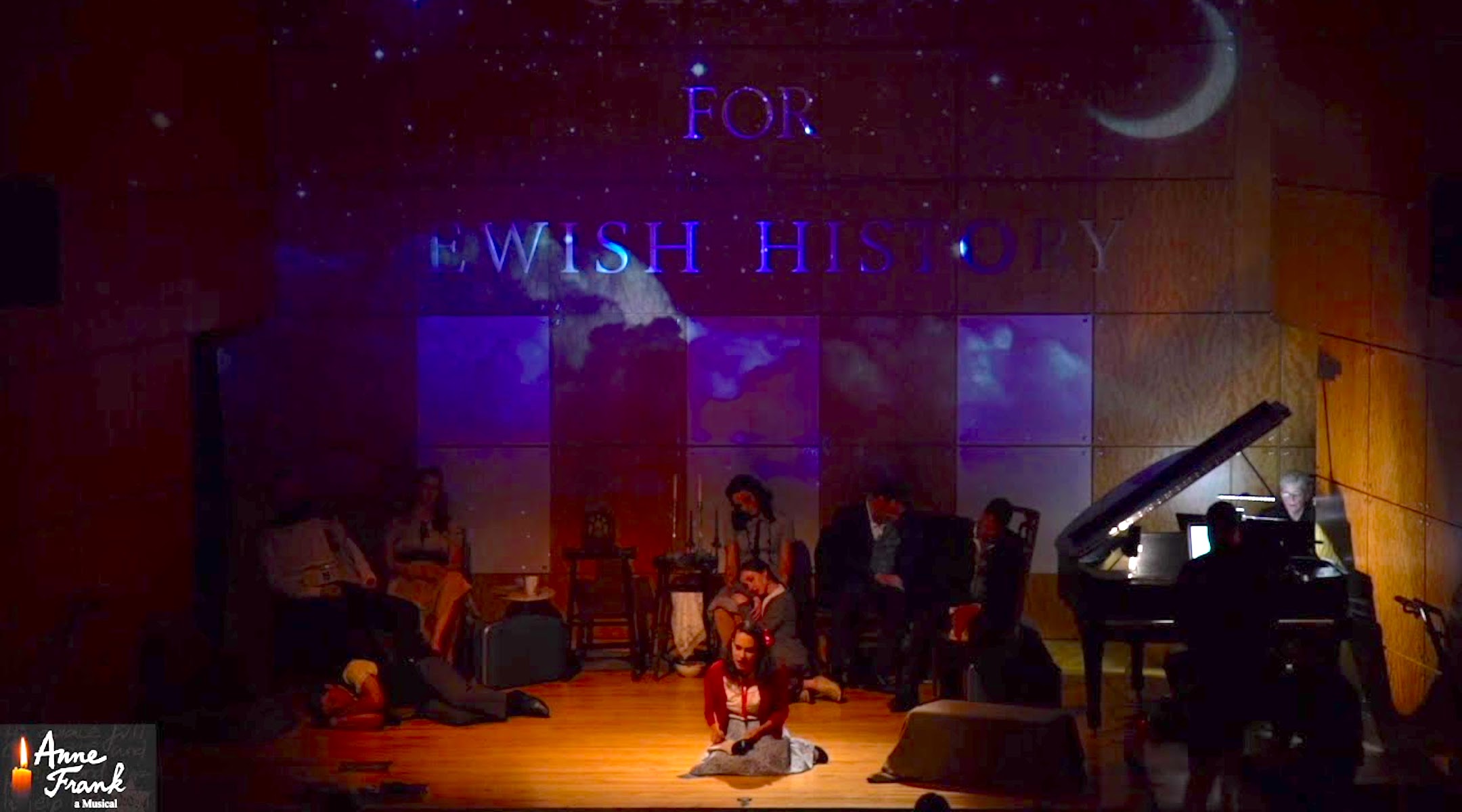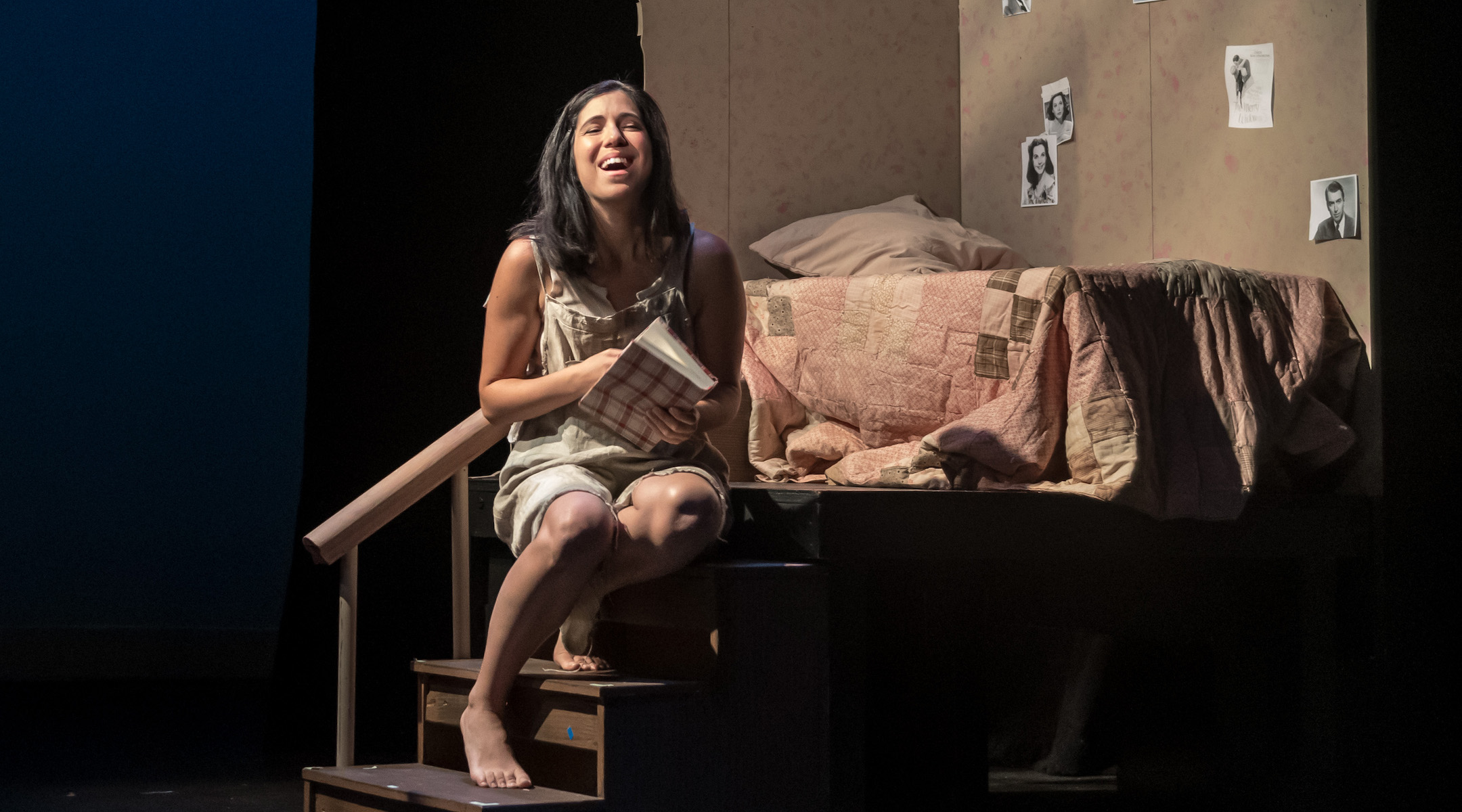(New York Jewish Week) – A young woman imagines herself standing inside the office of a fast-talking, bowtie-wearing, pipe-smoking editor of a major publishing house in New York City.
She’s just submitted her diary — a memoir of her life in hiding from Nazis and subsequent detention in a concentration camp — for his review, and stands in front of him as he scrutinizes her experiences, deeming them plausible or not, appropriate or absurd.
The woman is Anne Frank, and the imagined scene is the premise of “Anne Being Frank,” one of two shows based on Frank’s diary that are running Off-Broadway in New York City this fall. The other is “Anne Frank, a Musical.”
The one-woman show, which opened on Sept. 4 at Manhattan’s Emerging Artists Theatre, presents a new version of the Anne Frank story in which she pens her diary while she is dying in the Bergen-Belsen concentration camp, rather than writing it while in hiding in Amsterdam. The show depicts her suffering from starvation and sexual assault in the camps, and eventually contracting a lethal case of typhus, all of which changes the tone of her writing.
“Instead of leaving people with this idea that all these people are really good at heart, she’s grown up and seen the atrocities and the things that have happened to her,” Amanda Lerner, the director of “Anne Being Frank,” told the New York Jewish Week, referencing a famous passage of the diary in which Frank writes, “I still believe, in spite of everything, that people are truly good at heart.”
Lerner added that she wanted to represent the experience of Holocaust victims in the camps and depict the “truth of all of the other people who have lived these stories — without apologizing for it,” she said.
Frank’s story is among the most well-known Holocaust narratives, and the creators of both shows said that they saw it as an avenue for conveying the gravity of the Holocaust to audiences, especially non-Jewish ones. The two productions come during a time when works about Frank’s life have taken a central place in national debates about education and censorship. Recently, multiple school districts have banned a graphic novel based on Frank’s diary, and in September, a teacher was allegedly fired in Texas for reading it aloud to students.
Earlier this year, the National Geographic limited series “A Small Light” told the Anne Frank story from the perspective of Miep Gies, the woman who helped hide the Frank family.
“For me, the Anne Frank story is, and really should be, universal,” said David Serero, who directed and produced “Anne Frank, a Musical,” and stars as Frank’s father, Otto. “Of course, it’s a Jewish story, but I think it’s important to share that story so it will never happen again. It’s important for others to know the damage that such a thing can do.”
The diary has been adapted dozens of times in the more than seven decades since its publication, beginning with the 1955 Broadway show, “The Diary of Anne Frank,” which won the Pulitzer Prize for Drama and Tony Award for Best Play.
“In the 1950s, when her diary came out, Anne Frank became the most well known victim of the Holocaust,” said Dr. Alex Sagan, a historian affiliated with Harvard’s Center for European Studies who has written extensively about adaptations of Anne Frank’s diary. “It’s a famous and resonant story. Everybody knows it, and it’s understandable that lots of people are inspired to retell it. The question is, what should our judgment be about what they produce?”
He said adaptations should be judged based on whether they “impart accurate information or mislead us,” and added that observers should “ask to what extent does an it teach us or make us feel something about the story of Frank or about her diary that is really meaningful.”
He said that while adaptations and retellings should stay accurate to the diary and the known history, there is still plenty of opportunity for artistic license.
“They’re going to reflect the moment in which they’re created, the medium in which they’re created and the creators,” he said. “So it doesn’t mean that they have no individuality, and it means that when they’re created, they can be highly relevant if they’re well done.”
The publishing house scene in “Anne Being Frank” speaks to the question of whether and how future generations will receive Holocaust stories. In the play, Anne (played by actress Alexis Fishman) imagines the conversation with the editor as she lays dying in her bunk in Bergen-Belsen.
She considers how an editor — and the world — might perceive her and her story after they learn the truth about humanity. The editor, while praising her as a writing prodigy, finds the details, especially the events in the camps, implausible.
“The reason that I have spent such a great chunk of my career in writing speculative history is that I truly believe that truth is stranger than fiction — that no writer can match the sheer unpredictability and madness of the real world,” said Ron Elisha, the play’s writer. “There’s nothing that happens in my play that could not have happened. These things happened. They need to be explained.”

“Anne Frank, a Musical” premiered at the Center for Jewish History in 2019. (Courtesy David Serero)
The second show out this fall, “Anne Frank, a Musical,” is less speculative about what happens after Frank was discovered in the annex in Amsterdam. Instead, it reinterprets the events depicted in Anne’s diary through song.
The musical, which was originally written in French by Jean-Pierre Hadida in 2007, was adapted for an American audience in English by Serero. It premiered in 2019 at the Center for Jewish History and opens this year on October 11 at the Actor’s Temple Theater.
“Of course, people in America and in New York were a little bit reluctant when they heard, ‘a musical about Anne Frank,’ but a musical doesn’t have to be about something joyful. It’s emotive,” Serero said. “I can assure you, I have a lot of respect in the approach of all the characters in order to make them believable onstage.”
The musical opens in the present day, with a group of teenagers visiting the Anne Frank House in Amsterdam. When they start to ask questions about her life, they are quickly transported back in time to the same place in 1942.
“To bring it through the medium of music is very important because we sing what we cannot say — there are things that only music can express,” Serero said. “When you add music, the diary of Anne Frank becomes the life of Anne Frank.”
And though the productions approach the story differently, they each reflect contemporary perspectives on the world. “Anne Being Frank” aims to show the graphic, violent suffering and death of Jews in the Holocaust, and to invite viewers to think about what happened next — rather than solely the hope reflected in the most famous passage of Frank’s diary. The show, in some ways, asks its viewers to interrogate other places or moments where the full story isn’t being told.
For Serero, the “secret of the musical’s success,” is that it connects Frank’s story to atrocities today.
“You could say that this story is over,” he said. “But still today, people are killed because of who they are.”
“Anne Being Frank” is playing at the Emerging Artists Theatre (15 W. 28th St.) through Oct. 29; tickets start at $59. “Anne Frank, a Musical” is playing from Oct. 11 through Nov. 5 at the Actors Temple Theatre (339 W. 47th St.). Tickets start at $36.50.
The New York Jewish Week brings you the stories behind the headlines, keeping you connected to Jewish life in New York. Help sustain the reporting you trust by donating today.





